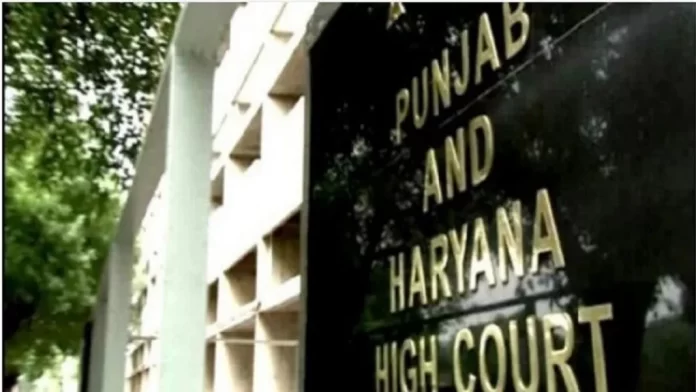The Punjab and Haryana High Court has disposed of a Public Interest Litigation (PIL) praying for the quashing of Expressions of Interest (EoI) invited for preparation of District Survey Reports before inviting bids for mining of sand in Punjab.
The petitioner claims that in violation of the Supreme Court judgment passed in 2020, (State of Bihar Vs. Pawan Kumar), the task of preparation of DSRs in the State of Punjab has been assigned to private agencies.
While filing reply, the respondents have asserted that State Environment Impact Assessment Authority, Punjab, in its meeting held on 12.04.2022, recommended that since the preparation of DSRs is an elaborate, technical and scientific exercise, the National Accreditation Board for Education and Training (NABET) accredited consultant may also be associated by the District Committee to guide and assist them. SubDivisional level committees headed by the Sub-Divisional Magistrate for preparation of DSRs have been constituted with the officials and the aforesaid committees have prepared the DSRs with the help of satellite images and Differential Global Positioning System (DGPS) and 14 DSRs have been approved by State Environment Impact Assessment Authority, Punjab, in the year 2022 and 2023 and at present, no pending request for approval of DSRs from State Government is pending.
The Division Bench of Chief Justice Sheel Nagu and Justice Anil Kshetarpal heard the counsel for the parties and is of the considered view that the petitioner has effective remedy of filing a petition before the National Green Tribunal constituted under National Green Tribunal Act, 2014. The jurisdiction of NGT under Section 14 of the 2014 Act includes the civil cases where a substantial question relating to environment is involved and such question arises out of implementation of enactment specified in Schedule I. Substantially, petitioner’s apprehension is with respect to association of private agencies in preparation of DSRs. The Bench concludes that NGT, which consists of experts in the field, is better equipped to examine the matter. It has been repeatedly held by the Supreme Court that where an effective alternative remedy is available, the Court should not allow Public Interest Litigation (PIL) in the form of petitions to be filed.
The Bench referred the string of judgements of Apex Court in Jaipur Shahar Hindu Vikas Samiti Vs State of Rajasthan and others, (2014) 5 SCC 530 and Jafar Imam Naqvi Vs Election Commission of India, (2014) 15 SCC 420, that in the event of availability of an alternative statutory remedy, the cause raised in a petition filed as Public Interest Litigation ought not to be entertained unless the said remedy is exhausted before hand.
The relevant portions of the above-mentioned judgements are reproduced below:-
Jaipur Shahar Hindu Vikas Samiti Vs State of Rajasthan and others (supra):- “49. The concept of public interest litigation is a phenomenon which is evolved to bring justice to the reach of people who are handicapped by ignorance, indigence, illiteracy and other downtrodden people. Through the public interest litigation, the cause of several people who are not able to approach the court is espoused. In the guise of public interest litigation, we are coming across several cases where it is exploited for the benefit of certain individuals. The courts have to be very cautious and careful while entertaining public interest litigation. The judiciary should deal with the misuse of public interest litigation with iron hand. If the public interest litigation is permitted to be misused the very purpose for which it is conceived, namely, to come to the rescue of the poor and downtrodden will be defeated. The courts should discourage the unjustified litigants at the initial stage itself and the person who misuses the forum should be made accountable for it. In the realm of public interest litigation, the courts while protecting the larger public interest involved, should at the same time have to look at the effective way in which the relief can be granted to the people whose rights are adversely affected or are at stake. When their interest can be protected and the controversy or the dispute can be adjudicated by a mechanism created under a particular statute, the parties should be relegated to the appropriate forum instead of entertaining the writ petition filed as public interest litigation.”
Jafar Imam Naqvi Vs Election Commission of India (supra):-
“9. The petitioner has submitted that this Court being the guardian of the Constitution is obligated to issue notice, call for the response and issue appropriate directions. Be it stated, the Election Commission might have taken note of it and initiated certain action. The matter of handling hate speeches could be a matter of adjudication in an appropriate legal forum and may also have some impact in an election dispute raised under the Representation of the People Act, 1951. Therefore, to entertain a petition as a public interest litigation and to give directions would be inappropriate. We have said so in view of the judgments in Manohar Joshi v. Nitin Bhaurao Patil [Manohar Joshi v. Nitin Bhaurao Patil, (1996) 1 SCC 169] and Ramchandra G. Kapse v. HaribanshRamakbal Singh [Ramchandra G. Kapse v. HaribanshRamakbal Singh, (1996) 1 SCC 206].”
Keeping in view the aforesaid facts, the High Court decided that the petitioner is relegated to the remedy before NGT.


